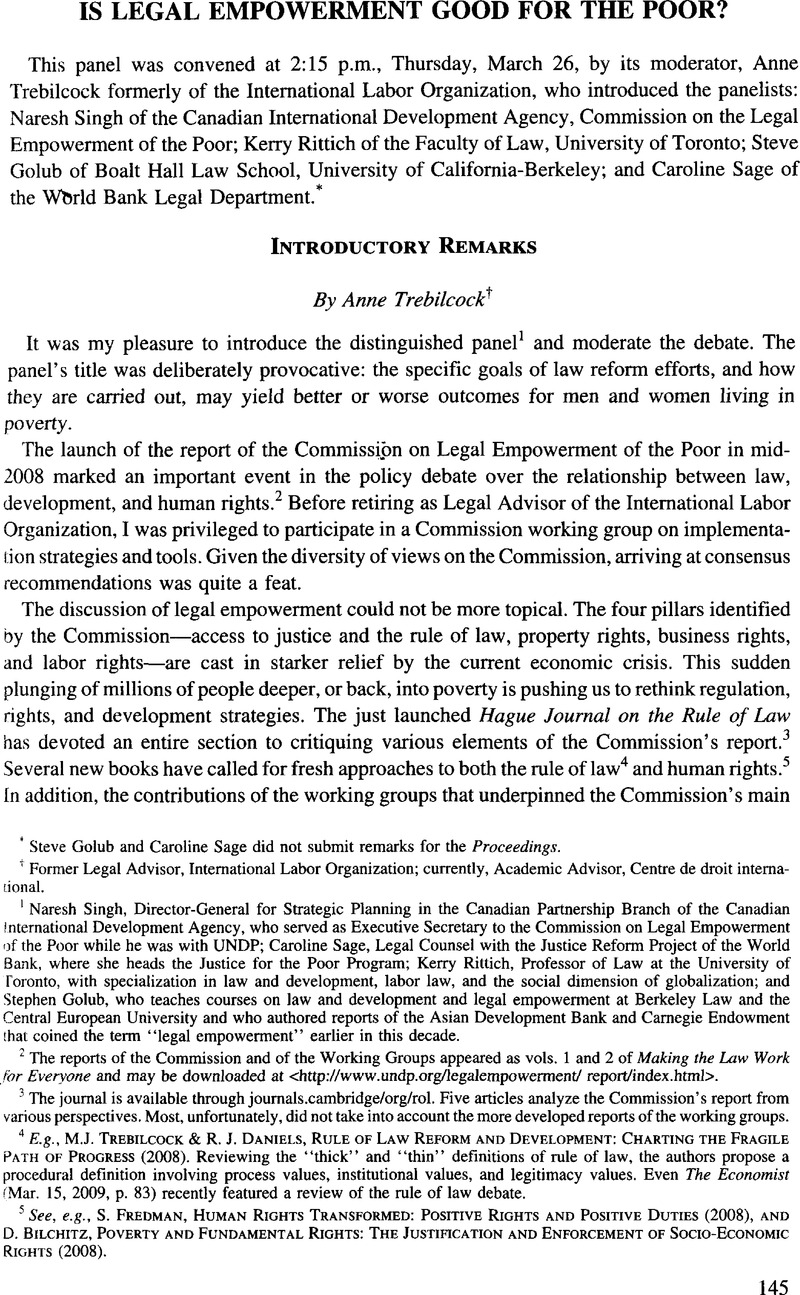No CrossRef data available.
Article contents
Introductory Remarks
Published online by Cambridge University Press: 28 February 2017
Abstract

- Type
- Is Legal Empowerment Good for the Poor?
- Information
- Copyright
- Copyright © American Society of International Law 2009
References
1 Naresh Singh, Director-General for Strategic Planning in the Canadian Partnership Branch of the Canadian international Development Agency, who served as Executive Secretary to the Commission on Legal Empowerment of the Poor while he was with UNDP; Caroline Sage, Legal Counsel with the Justice Reform Project of the World Bank, where she heads the Justice for the Poor Program; Kerry Rittich, Professor of Law at the University of Toronto, with specialization in law and development, labor law, and the social dimension of globalization; and Stephen Golub, who teaches courses on law and development and legal empowerment at Berkeley Law and the Central European University and who authored reports of the Asian Development Bank and Carnegie Endowment that coined the term “legal empowerment” earlier in this decade.
2 The reports of the Commission and of the Working Groups appeared as vols. 1 and 2 of Making the Law Work for Everyone and may be downloaded at <http://www.undp.org/legalempowennent/report/index.html>.
3 The journal is available through journals.cambridge/org/rol. Five articles analyze the Commission’s report from various perspectives. Most, unfortunately, did not take into account the more developed reports of the working groups.
4 E.g., M.J. Trebilcock & R. J. Daniels, Rule of Law Reform and Development: Charting the Fragile Path of Progress (2008). Reviewing the “thick” and “thin” definitions of rule of law, the authors propose a procedural definition involving process values, institutional values, and legitimacy values. Even The Economist (Mar. 15, 2009, p. 83) recently featured a review of the rule of law debate.
5 See, e.g., S. Fredman, Human Rights Transformed: Positive Rights and Positive Duties (2008), and D. Bilchitz, Poverty and Fundamental Rights: The Justification and Enforcement of Socio-Economic Rights (2008).
6 See, e.g., Trebilcock, A., Using Development Approaches to Address the Challenge of the Informal Economy for Labour Law, in Boundaries and Frontiers of Labour Law 63-86 (Davidov, G. & Langille, B. eds., 2006)Google Scholar.
7 F. Lapeyre, The Outcome and Impact of the Main International Commissions on Development Issues, Policy Integration Department Working Paper No. 30 (ILO, Geneva, 2004).
8 A Fair Globalization: Creating Opportunities for All (ILO, Geneva, 2004), available at <http://www.ilo.org/fairglobalization/report/lang—en/index.htm>.
9 See, e.g., United Nations, 2005 World Summit Outcome, Doc.A/RES/60/1, ¶ 47 and Chief Executives Board for Coordination: Toolkit for Mainstreaming Employment and Decent Work (ILO/Chief Executives Board, Geneva, 2007).
10 See International Labour Organization, ILO Declaration on Social Justice for a Fair Globalization, available at <http://www.ilo.org/wcmsp5/groups/public/—dgreports/—cabinet/documents/publication/wcms_099766.pdf>.
11 See Otto, J. M., Rule of Law Promotion, Land Tenure and Poverty Alleviation: Questioning the Assumptions of Hernando de Soto, 1 Hague J. Rule of Law 173-195 (2009)CrossRefGoogle Scholar.




